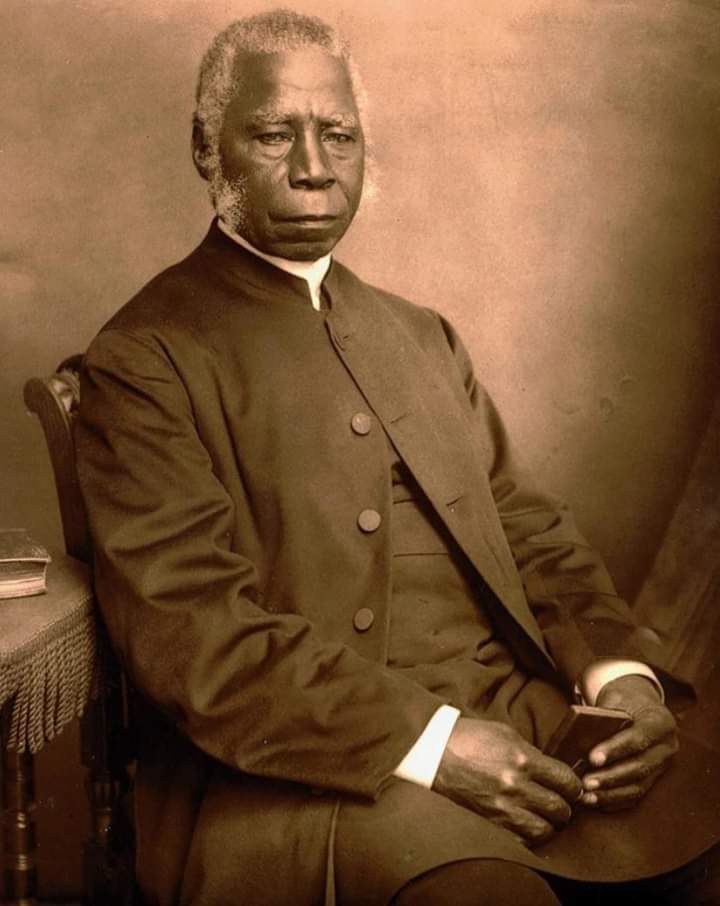This month marks the 129th year since the greatest Yorùbá linguist – Bishop Samuel Ajayi Crowther departed to join his ancestors. He died on the 31st of December 1891 in Lagos.
For millennia, the Yorùbá language remained largely unwritten until the 17th century when some Yorùbá Muslims started using the Ajami script, a form of Arabic script for their writings. The Ajami script was not successful and did not take off. Moreover, there was no grammar text to accompany the script and its usage was restricted to those who knew Arabic.
The written Yorùbá with Latin alphabet as we know it today did not exist until this great man showed up! Arguably, without his contribution, our languages would have remained solely oral for more years.
He was born circa 1809 in Oṣogun (in what is now Isẹyin Local Government, Ọ̀yọ́ State, Nigeria). When he was 12 years old, Ajayi was captured, along with his mother and toddler brother and other family members, along with his entire village, by Fulani slave raiders in 1821 and sold to Portuguese slave traders.
However, before his slave-ship left port, it was boarded by a British Royal Navy ship under the command of Captain Henry Leeke, and Crowther was taken to Freetown, Sierra Leone, where he was released. Ajayi’s mother was a descendant of King Abiọdun.
He became interested in languages in Freetown and in 1826 he travelled to England to attend St Mary’s Church in Islington and the church’s school. On his return in 1827 the became the first student of the newly opened Fourah Bay College in Freetown, where his interest in language found him studying Latin and Greek but also Temne. After completing his studies he began teaching at the school.
He married a schoolmistress, Asano who was also rescued from the Portuguese slave ship that originally brought Crowther to Sierra Leone. Their several children included Dandeson Coates Crowther, archdeacon of the Niger Delta.
Crowther was father-in-law to Thomas Babington Macaulay, a junior associate, who married Crowther’s 2nd daughter (Abigail Crowther). Crowther’s grandson Herbert Macaulay became one of the first Nigerian nationalists and played an important role in ending British colonial rule in Nigeria.
Crowther was also a close associate and friend of Captain James Pinson Labulo Davies, an influential Yorùbá politician, mariner, philanthropist and industrialist in colonial Lagos. Both men collaborated on a couple of Lagos social initiatives such as the opening of The Academy (a social and cultural center for public enlightenment) on 24 October 1866 with Crowther as the 1st patron and Captain J.P.L Davies as 1st president.
Bishop Crowther began translating the Bible into the Yoruba language and concluded it in the mid-1880s known as “Bibeli Mimọ”. The complete Yoruba Bible was first published in 1884.
In early 1840s, he compiled the first Yorùbá dictionary. In 1843, a grammar book which he started working on during the Niger expedition was published; and a Yoruba version of the Anglican Book of Common Prayer followed later.
Bishop Ajayi Crowther also compiled “A vocabulary of the Yorùbá language”, including a large number of local proverbs, published in London in 1852. He also began codifying other languages. Assisted by a young Igbo interpreter named Simon Jonas, Crowther produced a primer for the Igbo language in 1857, another for the Nupe language in 1860, and a full grammar and vocabulary of Nupe in 1864.
Sure, some mistakes were made during the translation of the Bible into Yorùbá for example, the translation of Devil/Satan into Èṣù. Let us however remember that this man was forcefully kidnapped from his homeland as a 12-year old child. His vocabularies were still in their infancy. He did not return back to Yorùbáland until 1843 at the age of 34!
Most of the translation works were done in Sierra Leone single-handedly and anyone who has been involved in any form of translation knows how daunting this exercise can be. Only people with deep knowledge of Ifá could really understand who Èṣù is really is, certainly not a twelve years old boy.
It our duty to correct the mistakes made during the translation. The great man did his best for the motherland. His works made other works possible – D. O Fágúnwà, J. F Ọdunjọ, Wande Abímbọ́lá, Adebayọ Faleti, Akinwunmi Iṣọla, Afọ̀labi Ọlabimtan, Duro Ladipọ, Kayode Fakinlede, Bode Oje etc.
To know how difficult translation is, try translating your favourite English book (novel, textbook, poem etc) into Yorùbá without a dictionary. Bishop Ajayi Crowther did not have a dictionary when he was doing his translations. He coined new words and pioneered Yorùbá neologism.
Let’s not allow the mistranslation of the Christian Devil/Satan to becloud the achievements of this great pioneer and architect of our written language. Our Òrìṣà and Irúnmọlẹ̀ including Èṣù Láàlú are capable of fighting for themselves, they do not need our assistance. All we can do is put the record straight. I commend the great work of the Òrìṣà/Ìṣẹ̀ṣe community in this area especially the “Èṣù is not Satan” campaign.


